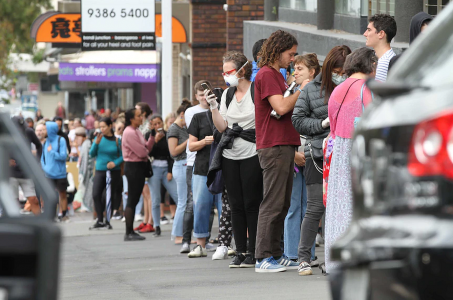MGM Dented by Another Downgrade, Analyst Sees Vegas Volatility
Posted on: September 16, 2020, 10:37h.
Last updated on: September 16, 2020, 11:09h.
It’s been a week of downgrades for MGM Resorts International (NYSE:MGM). The stock suffered its second lower revision in three days Wednesday, with the Las Vegas Strip looking like the primary culprit.

In a note to clients today, Roth Capital analyst David Bain lowered his rating on the Bellagio operator to “neutral” from “buy,” while paring his price forecast on the stock to $19, implying significant downside from the $23 area at which it currently trades.
MGM is the largest operator on the Strip, deriving half its 2019 earnings before interest, taxes, depreciation, amortization, and restructuring or rent costs (EBITDAR) from that market, according to Bain. Too much dependence on its home market is a potential drag on MGM stock at a time when Las Vegas is still grappling with the effects of the coronavirus pandemic.
Soft air travel, group/event compression, low pricing power and high fixed costs, including rent payments,” are among the issues highlighted by Bain. “4Q/1Q marks convention season, which is essentially non-existent, leaving MGM’s portfolio dependent on California leisure traffic.”
With convention traffic all but non-existent and leisure travelers from other regions unwilling to fly to Nevada, the Roth analyst points to Sin City’s dependence on the Golden State as a major near-term vulnerability because California’s own economy is struggling and is home to steep unemployment, owing to the COVID-19 pandemic.
No Real Estate, More Volatility
Last year, MGM sold Bellagio and Circus Circus, and the real estate liquidation theme continued into January, as the operator parted with MGM Grand and Mandalay Bay on the Strip.
The gaming company struck while the iron was hot, commanding strong pricing on those properties prior to the onset of the pandemic. That helped it amass a large cash hoard that kept it afloat during the multi-month shutdown of domestic casinos. Now, MGM has $8.1 billion in cash, giving it its strongest balance sheet ever. But Bain is concerned that the lack of real estate levers to pull means the operator is too levered to Las Vegas, and investors may be overlooking that risk.
“The cyclical, competitive, capital-intensive nature of the Strip combines with a basket of well-known macro/specific travel and Las Vegas negatives, seemingly dismissed by investors since IAC took a 12 percent stake in MGM,” said the analyst.
Last month, Barry Diller’s IAC paid $1 billion to acquire 12 percent of MGM’s equity, sparking a rally in the stock. That’s because investors are enthusiastic about Diller’s reputation for helping small consumer online assets become internet behemoths.
Raining on the Parade
IAC getting involved with MGM is much more about the gaming company’s online casinos and BetMGM units than it is about land-based integrated resorts. But Bain argues Diller’s company may have paid too much for the privilege.
BetMGM is a joint venture with GVC Holdings, meaning MGM has to share the economics with its UK-based partner. Additionally, the business will generate just $130 million in revenue this year, with profitability three years away, according to the Roth analyst.
“To be clear, we believe IAC ownership is a positive for MGM. But its land-based difficulties trump its digital opportunities by a wide margin,” said Bain.
Related News Articles
Most Popular
LOST VEGAS: The Foster Brooks Robot at MGM Grand
Bally’s Sets Date for Tropicana Las Vegas Implosion & Party
Most Commented
-
VEGAS MYTHS RE-BUSTED: You Don’t Have to Pay Resort Fees
— August 2, 2024 — 16 Comments -
VEGAS MYTHS RE-BUSTED: Elvis Was a Straight-Up Racist
— August 9, 2024 — 11 Comments -
ANTI-SOCIAL BEHAVIOR: Vegas Casino Buffet Stunt in Poor Taste Goes Viral
— August 16, 2024 — 7 Comments -
VEGAS MYTHS RE-BUSTED: The Strip Tried Appealing to Families and Failed
— August 23, 2024 — 7 Comments
















Last Comment ( 1 )
Vegas and the entire state is suffering because of our Governor Sisolak. He is more concerned with the party line rather than the economic and mental health of Nevadans.